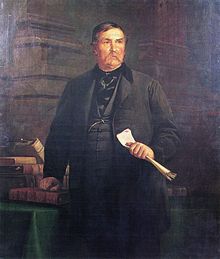Ferenc Deák
| Ferenc Deák | |
|---|---|

Portrait by Bertalan Székely
|
|
| 1st Minister of Justice of Hungary | |
|
In office 17 March 1848 – 2 October 1848 |
|
| Preceded by | office established |
| Succeeded by | Sebő Vukovics |
| Personal details | |
| Born |
17 October 1803 Söjtör, Kingdom of Hungary |
| Died | 28 January 1876 (aged 72) Budapest, Austria-Hungary |
| Resting place | Kerepesi Cemetery |
| Nationality | Hungarian |
| Political party | Opposition Party, Deák Party, Liberal Party |
Ferenc Deák de Kehida (archaically English: Francis Deak,Croatian: Franjo Deák; 17 October 1803 – 28 January 1876) was a Hungarian statesman and Minister of Justice. He was known as "The Wise Man of the Nation".
Born in Söjtör in the county of Zala, in south-western Hungary, Deák belonged to an ancient noble family. He studied law, and became successively an advocate and notary. He first went into politics in 1833 when he attended the assembly of Pressburg (now Bratislava) as a replacement for his older brother, beginning his career that would make him one of the most important personalities in the Hungarian politics and reforms of the 1840s. His name became known as a result of his involvement in the suit of Miklós Wesselényi and his success in declaring the Hungarian Assembly's right to create laws.
In 1836, Deák wrote and distributed a document about the cases that he supported without the permission of the censors; while it was confiscated, it was already widespread and made his name familiar in important circles. He was involved in the creation of the 1839–40 laws of the Assembly and became honorary member of the Hungarian Academy of Sciences. After the death of his brother in 1842, he liberated his serfs and voluntarily chose to pay taxes to show that he was sincere about his reforms. The abolition of the exemption of the nobles from all taxation in the Kingdom of Hungary and the liberation of serfs were some of the most important endeavours of the Reformist movement of the era. However, he refused to attend the Diet of 1843–44, supposedly due to strife surrounding the election.
In 1846, after the bloody end of the Polish uprising in Galicia the reformers gained popularity and they released the "Ellenzéki nyilatkozat" (Manifesto of Opposition) under the name of Deák, while it was in fact created by Kossuth. During the Hungarian Revolution of 1848 against the Habsburg Empire, Deák stayed calm and opposed violence as a political tool. He accepted a position as Minister of Justice in the Batthyány Government, mostly to show his support of Lajos Batthyány.
...
Wikipedia
